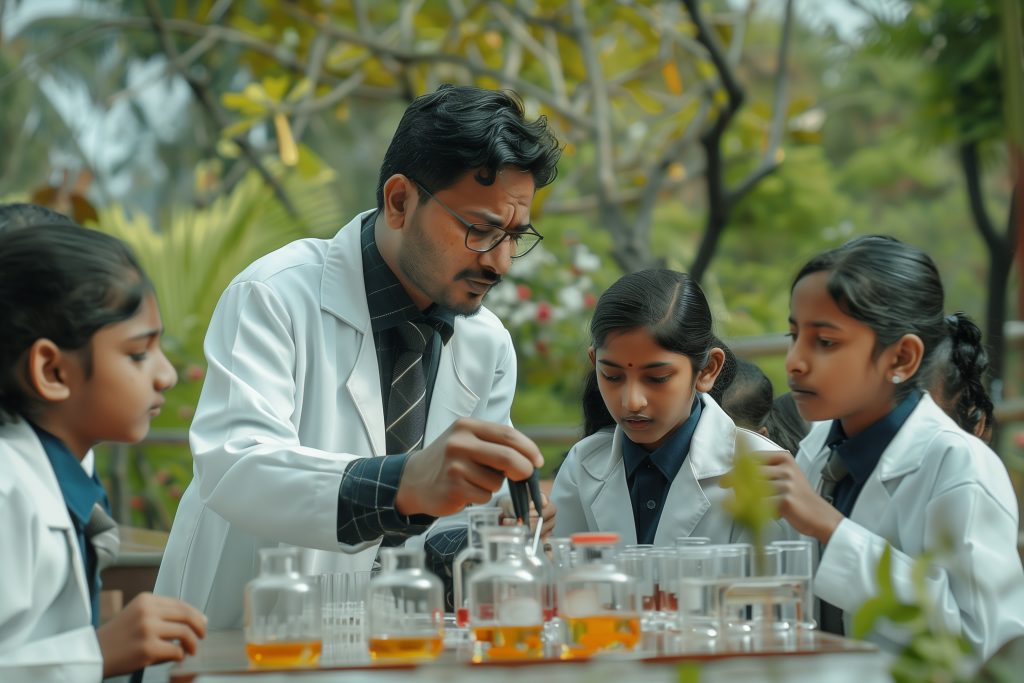Jobs for science stream students offer a wide range of career opportunities across fields like engineering, medicine, technology, research, and more.

Introduction:
Jobs for Science Stream: More Than Just Two Choices
Many science students grow up hearing only two main career options doctor or engineer. For years, these were seen as the best and safest jobs. But now, the world has changed. There are so many new careers where science students can do well. Some of these jobs are creative. Some help the environment. Others help people in different ways. A background in science teaches how to think clearly and solve problems. These skills are needed in many jobs today. This blog shares different career options for students who want something new.
Why Jobs for Science Stream Students Offer a Good Start
Science teaches more than just facts. It trains the brain to ask questions, look for answers, and think step by step. This way of thinking helps in many jobs, even ones outside the science lab. Science also teaches how to observe things, analyze data, and test ideas. These skills are useful in careers related to data, technology, communication, and design.
Data Jobs Are Growing Fast
In today’s world, everything runs on data. Businesses, hospitals, shops, and even apps collect information every day. Data analysts look at this information and help people make better decisions. Science students are good at working with numbers and thinking logically. That makes them a good fit for data jobs. With some online training in Excel, Python, or R, it is possible to start a career as a data analyst or data scientist. These jobs pay well and are needed in many industries.
Jobs That Help the Environment
Caring for the planet has become very important. Climate change, pollution, and loss of forests are big problems. Many companies and groups now work to protect the environment. They need people who understand science. Students who studied biology, chemistry, or physics can work in roles like environmental analyst, field worker, or conservation support. These jobs can be found in government, NGOs, and green companies. The work helps make the world a better place.
Psychology and People Skills
Mental health has become more important in recent times. Many people feel stressed, confused, or low and need someone to talk to. Psychology is the study of the mind and behavior. It is not only for arts students. A science background helps in understanding how the brain and body are connected. With further study, students can become counselors, school psychologists, or human resource specialists. These careers focus on listening to others, understanding feelings, and giving support. Patience and empathy are key in these roles.
Biotechnology: Helping Health Without Becoming a Doctor
Biotechnology is the mix of biology and technology. This field works on creating medicines, improving crops, and checking food safety. It helps in solving real-world problems. Many biotech jobs exist in labs and research centers. Roles include lab technician, clinical tester, or assistant researcher. These jobs need people who can follow safety rules and handle lab tools carefully. Science students who enjoy working in clean, quiet, and detailed environments can do well here.
Forensic Science: Science Meets Crime Solving
Forensic science is where science helps solve crimes. Police and law agencies use forensic experts to check fingerprints, blood, or other clues. This job needs attention to detail, calm thinking, and strong science knowledge. Chemistry and biology are used to understand samples and write reports. Many forensic scientists work in labs, courts, or with police. It’s a serious job that helps bring justice in real cases.
Space Science and Astronomy
Looking at the stars is not just a hobby; it can be a career. Astronomy and space science are growing fields. These careers involve studying planets, black holes, or satellites. Physics and math are important in this field. Space centers, research labs, and even private companies now hire people who are passionate about the sky. Careers include telescope operator, space researcher, or planetarium guide. Though deep study is needed, the joy of learning about the universe is worth it.
Technology Jobs Without an Engineering Degree

Coding and software development are no longer just for engineers. Anyone with logical thinking and basic computer knowledge can learn coding. Today, many companies hire developers, testers, and tech support staff with non-engineering backgrounds. Free online courses help build these skills. HTML, CSS, Python, and JavaScript are beginner-friendly languages. Learning through practice is the key. A small project or app can help get noticed by employers.
Science Communication: Explaining in Simple Words
Many people find science difficult to understand. That’s where science communicators help. These professionals explain scientific ideas through articles, videos, or podcasts. Schools, news websites, and museums hire such people. The job needs good writing or speaking skills. This role is perfect for someone who enjoys both science and storytelling. Making science simple helps students, the public, and even policy makers.
Food Technology: Where Science Meets Taste
Food technologists work behind the scenes to make sure food is safe and tasty. They check ingredients, study how food reacts in storage, and help create new products. These jobs are found in food factories, hotels, or testing labs. Science students with a background in chemistry or biology fit well here. The job needs clean habits, attention to detail, and some creativity too. Every product on a shelf is touched by food science.
UI/UX Design: Making Apps Easy to Use
User Interface (UI) and User Experience (UX) design is about how people interact with websites and apps. These designers make sure a user finds the app easy, helpful, and smooth to use. A science student with logical thinking and a creative eye can learn this easily. Design tools like Figma or Adobe XD can be learned online. A short course, along with a sample project, is enough to enter this field. This role is a mix of psychology, design, and tech.
Other Science-Based Career Options
Some jobs are less talked about but very important. Meteorology is the study of weather and climate. Meteorologists help in forecasting rain, storms, or heat waves. Geneticists study DNA to understand health or family traits. Medical lab workers test blood and other samples in clinics and hospitals. Patent examiners use science to check if new ideas and inventions are real and original. All these roles use science daily and help society grow.
Teaching is also a wonderful option. School and college teachers shape young minds and pass on science knowledge. Many students enjoy learning from someone who truly understands and loves the subject. With a teaching degree or certification, science teaching can become a rewarding career.
Jobs for Science Stream: How to Explore and Choose the Right Career
Choosing a job path doesn’t have to happen overnight. Exploring different options slowly is a better idea. Watching videos, reading about careers, and talking to professionals helps in learning more. Online platforms offer free courses that give a clear picture of each role. A short internship, volunteering, or project gives hands-on experience.
Trying new things is not a waste of time. It helps find what feels right. Some careers need extra study, while others only need basic training. Taking one step at a time is the best way to find a path that brings both growth and happiness.
What Employers Want from Jobs for Science Stream Students
Good marks are important, but not enough. Employers want people who are honest, hardworking, and eager to learn. The ability to think clearly, solve small problems, and work in a team matters more than big degrees.
Science students already have skills like observation, patience, and careful work. These qualities are valued in every industry. Simple soft skills like clear communication, time management, and being calm under pressure are important. These can be learned with practice.
Job readiness comes with small efforts, like writing a resume, attending workshops, and doing short tasks. Taking help from teachers, mentors, or online platforms can make this journey easier.
Helpful Platforms to Find Jobs for Science Stream Students and Gain Skills
Several websites are designed to help fresh graduates. Platforms like Impacteers, Internshala, and LinkedIn offer job listings, resume tips, interview questions, and mini-projects. These websites are free to use and give exposure to real-world work. Some also offer short-term internships, freelance work, or competitions that help build experience.
Starting with small jobs is a good way to enter the industry. Learning through work is faster and more effective than just reading books.
Conclusion: Exploring the Best Jobs for Science Stream Students
A science background is powerful. It gives clear thinking, careful methods, and curiosity. These qualities can be used in many careers not just in medicine or engineering.
Today’s world offers many roles: from helping the environment to creating websites, from explaining science to designing food, from solving crimes to reading the stars. Each field welcomes science students.
What matters most is interest, effort, and willingness to learn. Every career needs a start. That start comes from taking a small step. A bright future is possible—with science and the right direction.
Vist Us >>> https://www.impacteers.com/home
About Us >>> https://blog.impacteers.com/
Here are 5 FAQs that you can add to the blog post “Better Jobs for Science Students Who Don’t Want to Be a Doctor or Engineer”:
FAQS:
1. I don’t like biology or chemistry. Can I still find a good job with a science background?
Answer: Yes, absolutely! Science is not only about biology or chemistry. You can explore fields like data science, UI/UX design, coding, astronomy, psychology, or meteorology. These areas focus more on logic, math, creativity, or problem-solving. Your science skills can still be useful in many careers.
2. Do I need to study more to get these jobs?
Answer: Some jobs may need extra courses or certifications (like data analysis, psychology, or biotechnology). But many careers can start with just online training or internships. You don’t always need a long degree. Learning small skills step by step and gaining real experience is more important.
3. Can science students become teachers or work with children?
Answer: Yes! Science students can become school teachers, especially in subjects like physics, chemistry, or biology. With a B.Ed. or teaching certification, you can teach in schools or coach in tuition centers. You can also work with children in science workshops, NGOs, or as counselors.
4. I’m interested in creativity. Are there science jobs for creative people?
Definitely. Careers like UI/UX design, science communication, food technology, and environmental design combine creativity with science. You can design apps, write science stories, create videos, or invent new food products. Creativity is a big strength in today’s job market.
5. Where can I start looking for such jobs and courses?
You can start with platforms like Impacteers, Internshala, LinkedIn, and Coursera. These sites offer free and paid courses, internships, and job openings. You can also join science forums or follow career blogs for tips and updates.



Post Comment